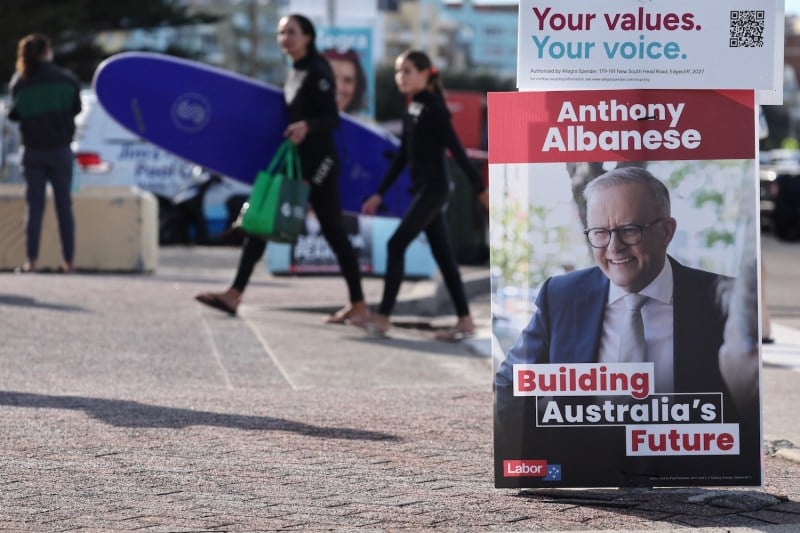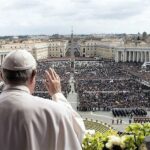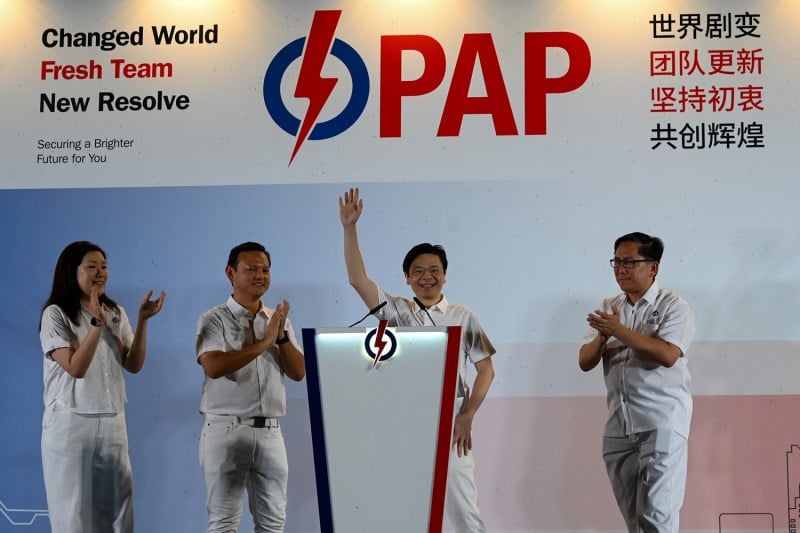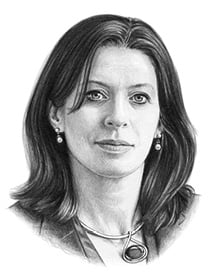The Australian Election Wasn’t Just About Trump

The Australian Election Wasn’t Just About Trump
A landslide for the center-left could inspire social democratic parties worldwide.
A surfer carrying a surfboard passes a poster for Australian Prime Minister Anthony Albanese on Bondi Beach in Sydney on May 3. (Photo by DAVID GRAY / AFP)
Anthony Albanese, who this weekend became the first Australian prime minister to win reelection since 2004, never once mentioned U.S. President Donald Trump on the campaign trail. Nonetheless, the consensus is that Trump was all over this election—even Albanese’s victory address, albeit never by name.
In her introduction of the prime minister, Foreign Minister Penny Wong said “some might want to mimic the worst of other countries,” but that Albanese “always backs what’s best about our country.” The prime minister in turn emphasized that “today, the Australian people have voted for Australian values.”
Anthony Albanese, who this weekend became the first Australian prime minister to win reelection since 2004, never once mentioned U.S. President Donald Trump on the campaign trail. Nonetheless, the consensus is that Trump was all over this election—even Albanese’s victory address, albeit never by name.
In her introduction of the prime minister, Foreign Minister Penny Wong said “some might want to mimic the worst of other countries,” but that Albanese “always backs what’s best about our country.” The prime minister in turn emphasized that “today, the Australian people have voted for Australian values.”
These were rebukes to the opposition more than barbs aimed at Washington. The opposition Liberals—who are, despite the name, a conservative party, in a long-term coalition with the rurally focused National Party—had taken a different tack through the campaign. Prominent Sen. Jacinta Nampijinpa Price had cheered “Make Australia Great Again” in April; Price’s coalition partner David Littleproud called this phrasing a “slip of the tongue,” but some of opposition leader Peter Dutton’s proposed policies were straight from Trump’s playbook.
Before the campaign even started, Dutton named Price to a “government efficiency” role, promising to cut jobs in the education department and in government positions related to diversity and inclusion. Then, in the final weeks of the campaign, as polls suggested his imminent defeat, Dutton made a rightward lurch on culture war issues—by attacking some uses of land acknowledgments and suggesting politicians needed greater powers to deport criminals who were dual nationals.
On election night, Price was asked on the national broadcaster whether her “embrace” of Trump had contributed to her party’s loss. Price’s response was telling: “If you swing enough mud in an election, it sticks.” For both sides of politics, Trump has become mud. But did the U.S. president define this election, in a replay of what happened in the Canadian elections last month? And if there was more at stake than Trump, could Australia’s center-left teach fellow travelers in Europe and elsewhere how to turn back a right-wing nationalist tide?
By the end of 2024, a year of elections worldwide, two trends had coalesced into conventional wisdom. The first was that as developed countries underwent significant economic and social upheaval following the pandemic, incumbents were toast. The second was that as far-right parties enforced strict borders, immigration had undone social democratic parties.
After unexpected victories for the center-left in Canada and Australia, however, whether the U.S. is a bellwether or an outlier for other democracies is up for debate. Trump’s belligerent nationalism has made it difficult for right-wing politicians elsewhere to ride his coattails without seeming like they’re betraying their own national interests. In Canada, the opposition Conservative Party, which had previously gone out of its way to associate with Trump, lost last week’s elections after Trump’s tariffs and threats of annexation against America’s neighbor, despite a 22-point polling lead on Jan. 20.
The leadup to the Australian election saw two moments of intense focus on Trump. The first was his Oval Office meeting with Ukrainian President Volodymyr Zelensky in February. Australians were already wary of what Trump’s “America First” approach would mean for the country, with a March Lowy Institute poll finding public trust in the United States dropping to its lowest level in two decades. The specter of the U.S. president dressing down the leader of a nation fighting invasion rankled Australians still further. Despite Dutton distancing himself from Trump on Ukraine, the Liberals’ poll numbers dropped precipitously from the next week.
The second event was Trump’s announcement that Australian steel would not, as was the case in his first term, be exempted from a 25 percent tariff, and then, on “Liberation Day,” the news there would be no exemptions for Australia at all. Broad fear about Trump’s protectionism was coupled with specific concerns about whether or not Australia should break its 70-year security relationship with the United States—including a pricey submarine contract.
After the U.S. election, pundits had predicted Dutton would follow Trump’s lead and beat Albanese, seen as a milquetoast one-term centrist, with tough talk and tax cuts. But the tariffs shock put Dutton, a former police officer, out of step with the national mood. He had praised Trump as “shrewd” and a “big thinker” after Trump had proposed to “level” Gaza, and intimated that he could have secured a better outcome with Washington than Albanese’s no-deal. That approach backfired, and the internet crowned him “Temu Trump”—meaning that he was nothing more than a cheaper knockoff of the American leader. By the time the federal election was eventually called on March 28, it was considered Albanese’s to lose.
Yet focusing on Trump’s role alone misses that foreign policy, unlike in Canada, was not even close to the most important political issue for Australian voters. Instead, surveys consistently ranked cost of living (“cozzie livs,” according to the Australian penchant for abbreviation) at no. 1. Also ranked highly were affordable housing and improving health services. Albanese riffed on this by brandishing his own government-issued Medicare card as he unveiled an $8.5 billion influx into the public health care system. No one could call Albanese’s campaign visionary: Along with the proposal to strengthen Medicare, he promised modest tax cuts, more money for child care, and cutting student loan debt, while remaining conspicuously quiet on climate change and foreign policy. Yet resisting the impulse to enter into a broader debate with Dutton on the national character and direction served him well.
In addition to warning about “woke” school curricula, the opposition advanced a central proposition of lower inflation, higher productivity, and lower taxes. The dog whistles were unnerving, though, and even as Coalition leaders stressed cheaper gas and tax cuts, voters didn’t trust them not to gut institutions such as Medicare. Meanwhile, the Liberals’ attempts to capitalize on antagonism toward migrants—net overseas migration has been the main driver of population growth over the last 30 years as fertility rates have fallen—fizzled. Unlike in the United States, immigration didn’t even rank in the top five voter concerns.
Dutton’s perceived zealotry may have even worked against him, worsening a decadelong phenomenon of voters in metropolitan areas drifting away from the Liberals. The result was a loss of seats in Sydney, Melbourne, Brisbane, and Adelaide to moderate “teals”: independents, usually women, who rallied around pillars of government accountability, anti-corruption, and combating climate change. In diverse outer metropolitan seats, voters also flocked to the center-left. With the primary vote slumping to record lows, Dutton lost his own seat.
In contrast, Labor bucked predictions that it would win narrowly and possibly govern in a hung parliament with a resounding majority. The 2025 election might well be the party’s highest two-party preferred vote ever.
The Coalition wasn’t the only victim of Labor’s surge. Minor parties suffered major setbacks, despite Australia’s long-standing ranked choice voting system, which usually allows them a stronger role than in first-past-the-post systems like the United States. While the Greens boasted about the party’s highest-ever total votes, they look likely to have ceded two seats in the House of Representatives—both in Brisbane—back to Labor.
Pauline Hanson’s far-right One Nation, founded in the ’90s as an anti-immigration party, failed to pick up the lower house seats it hoped for. Dutton’s coalition struck a deal that suggested its voters make One Nation their second pick in many districts, contravening a long-standing agreement by the major parties to shun extremists. It was another sign that the Liberals had moved too far to the right.
Trumpet of Patriots, a party taken over in 2025 as a vanity project by mining magnate Clive Palmer intended to invoke Trump’s language, proved that money can’t buy everything. Palmer spent, by one estimate, $60 million on his nationwide campaign to win only 1.85 percent of the vote. Legalise Cannabis Australia fared better, accruing 1.14 percent of ballots with a spend of just $6,200.
Albanese has been rewarded by the electorate for sticking to the center. When it comes to international relations, he may not have that luxury. “There will be tensions,” the Quincy Institute’s Sarang Shidore predicted, as Australia navigates a path between China, its biggest trading partner, and the United States, its long-term security partner. “Albanese will want to keep the economic engine going, while being careful on the security side.”
Chinese influence is a fraught issue for Labor. In 2022, a plot by Chinese spies to bankroll Labor candidates in the federal election was exposed by the nation’s spy agency. This year, the incident was deployed by a Liberal campaign spokesperson—part of a long and inglorious lineage of “redbaiting” in Australian election campaigns—to play on a perception of Labor as soft on China.
And while the relationship between China and Australia has improved since they hit a nadir during COVID, with Beijing finally dropping prohibitively high tariffs on Australian wine last year, things remain uneasy. In February, for instance, Chinese warships sailed in international waters between Australia and New Zealand unannounced until warnings went out to airlines.
Trump appears to know who Albanese is, calling him a “friend” when asked about the election on Air Force One on Sunday. (He has not been as familiar with AUKUS.) While Albanese said the first official visit of his second term will likely be to Jakarta, not Washington, Canadian Prime Minister Mark Carney has invited him to the G-7 in Alberta next month. Trump, Carney, and Albanese should have lots to talk about.
In Australia, voters weren’t merely expressing an aversion to Trump. They were also rejecting ideological extremism of all stripes. Labor’s counterparts elsewhere, like the U.K.’s Labour Party, have adopted a harsher tone on issues like immigration out of fear of being outflanked by the far right. When Dutton called Albanese “weak,” Albanese responded that “kindness isn’t a weakness.” That might be a rallying cry for social democratic parties worldwide.
Amelia Lester is a deputy editor at Foreign Policy.
More from Foreign Policy
-

A drawn illustration of a Trump whirlwind on a red background Four Explanatory Models for Trump’s Chaos
It’s clear that the second Trump administration is aiming for change—not inertia—in U.S. foreign policy.
-

Marco Rubio is seen up close, sitting on a couch beside J.D. Vance. Marco Rubio’s Soulless Crusade
The U.S. secretary of state stands for no principle other than serving the man who appointed him.
-

Soldiers from various NATO allies take part in a military exercise at the Smardan Training Area in Smardan, Romania, on Feb. 19. America Will Miss Europe’s Dependence When It’s Gone
European self-reliance for security will cost U.S. jobs, profits, and influence.
-

A collage photo illustration shows Donald Trump gesturing with arms wide. In front of him are headshots of Benjamin Netanyahu and Vlodymyr Zelensky, images of immigratns and ICE police, a tattered EU flag and America First signs. Trump’s First 100 Days on the Global Stage
Ten thinkers on what to make of the opening salvo of the president’s second term.











Join the Conversation
Commenting on this and other recent articles is just one benefit of a Foreign Policy subscription.
Already a subscriber?
.
Subscribe
Subscribe
View Comments
Join the Conversation
Join the conversation on this and other recent Foreign Policy articles when you subscribe now.
Subscribe
Subscribe
Not your account?
View Comments
Join the Conversation
Please follow our comment guidelines, stay on topic, and be civil, courteous, and respectful of others’ beliefs.
Change your username |
Log out
Change your username:
CANCEL
Confirm your username to get started.
The default username below has been generated using the first name and last initial on your FP subscriber account. Usernames may be updated at any time and must not contain inappropriate or offensive language.